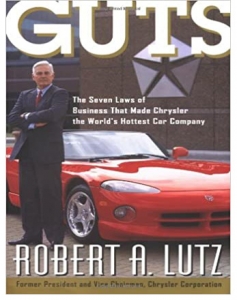Sharing Wisdom from the Greats in Blogging for Business
How did Chrysler, which not too long before had needed government-backed loans in order to survive, transform itself into a partner coveted by Daimler (the gold standard of European car makers), becoming the most profitable car company in the world? In his book Guts, Robert A. Lutz, Chrysler’s product-development genius answers these questions and many, many more.
For us blog content writers, there are several valuable lessons to be gleaned from this book by a business “great”:
The power of being personal:
Lutz lists his own credentials in the following order: parent, citizen, taxpayer, employer, alumnus. Guts is about Lutz himself as much as it is about his company, and that’s precisely what lends power to the narrative.
One interesting perspective on the work we do as professional bloggers is that we are interpreters, translating clients’ corporate message into human, people-to-people terms. That’s the reason I prefer first and second person writing in business blog posts over third person “reporting”. I think people tend to buy when they see themselves in the picture, but even more so, when they relate emotionally to the people bringing them the message.
- The power of recounting past struggles
The very name of Lutz’s book, Guts, speaks to past struggles, to hardships overcome. At Say It For You, I recommend including some How-I-Did-It posts in the blog marketing plan. There are several reasons that sharing secrets and failures helps readers relate to a business or practice:True stories about mistakes and struggles are very humanizing, adding to the trust readers place in the people behind the business or practice.
- Stories of struggles and failures can be used as a means to an end, using the special expertise and insights you’ve gained towards solving readers’ problems.
- Blogs also have a damage control function. When customer complaints and concerns are recognized and dealt with publicly (there’s nothing more public than the Internet!), that gives the “apology” – and the remediation – a lot more weight in the eyes of readers.
Does it help to share wisdom from leaders in your own industry or profession in your blog?
When you link to someone else’s accomplishments or remarks on a subject you’re covering, that can have two important positive effects: reinforcing a point you want to make and showing you’re in touch with trends in your own field. Obviously, as with all tools and tactics, “re-gifting” content needs to be handled with restraint.
To me, though, the biggest advantage of sharing others’ wisdom in your own content, is that you’re showing that you’re excited by the insights you’ve gained, and you want your readers to benefit as well.
Sharing wisdom? Go ahead, I say. We can never have too much inspiration.


Leave a Reply
Want to join the discussion?Feel free to contribute!